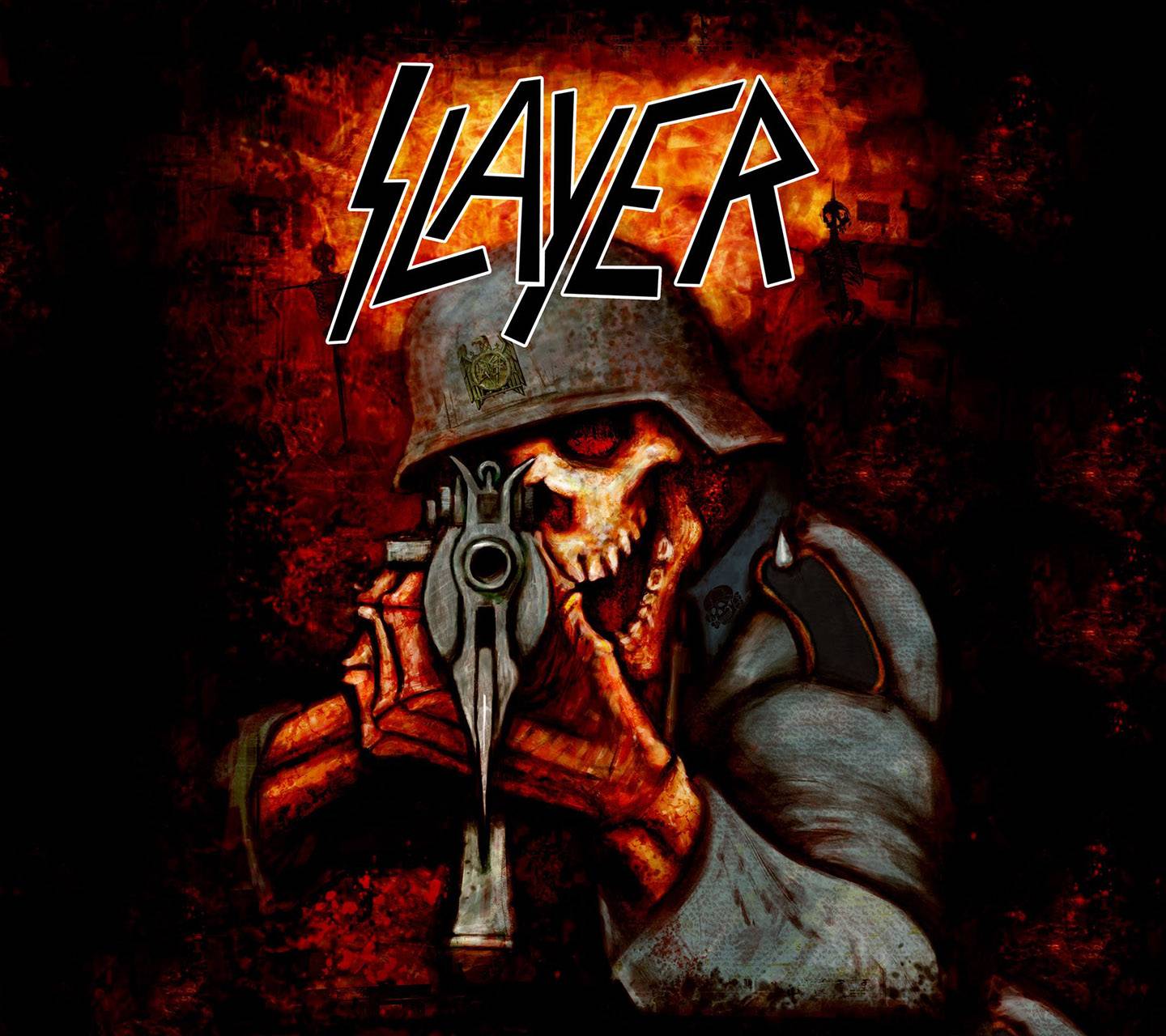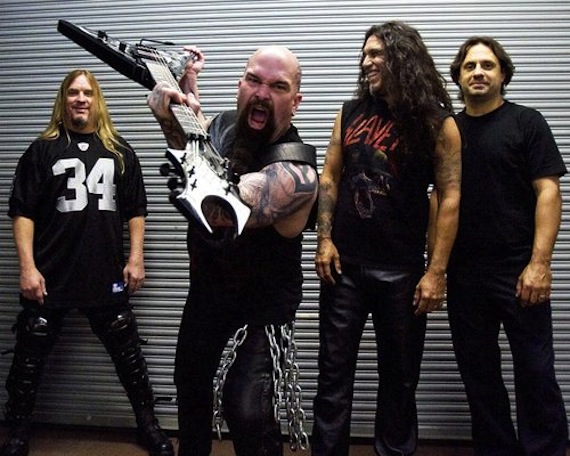Slayer Band

Artist Biography by Steve Huey
Black Sabbath are the original heavy metal band, the biggest, but Slayer are surely the heaviest. No other band, who came along before or since, has matched the fearsome power, deadly precision and crushing intensity of Slayer at their peak.Formed in the LA suburb of Huntington Park in 1981 by guitarists and, bassist/vocalist Tom Araya and drummer, Slayer started out as a regulation early-80s metal band, heavily influenced. But Hanneman, a fan of, pushed Slayer to play faster. And, inspired by British Devil-worshippers Venom, the archetypal black metal band, Slayer set out to create the most evil and brutal music known to man.Slayer’s debut album, Show No Mercy, released in 1983, just five months after Metallica’s, placed them at the vanguard of a new movement that was to revolutionise metal music: thrash. Slayer lined up alongside Metallica, and Anthrax in the so-called Big Four of thrash metal. And in 1986, having been signed to pioneering hip-hop label Def Jam, Slayer eclipsed their peers with the greatest of all thrash albums:. Still widely regarded as the heaviest album ever made, it set the benchmark for subsequent generations of extreme metal bands, and has cast a long shadow over everything Slayer have done since.Certainly Slayer have had their ups and downs.
This comes on the heels of the recent screenings of Slayer's The Repentless Killology, which wrapped up the visual narrative from the band's.
When Lombardo, the best drummer of the thrash era, quit the band for a full decade, Slayer lost their way; they even incorporated elements of nu metal on their 1998 album Diabolus In Musica. But Lombardo’s reinstatement in 2002 put them firmly back on track – until he departed the band for a second time in 2013.The death of Hanneman in 2013 sent seismic waves through the Slayer camp, and added an extra level of uncertainty to the band's future. In 2018, they announced they'd be bowing out after 12 albums, embarking on a world tour which will bring their career to an end in in late 2019.Here, we cast our eyes over the heaviest band in music's back catalogue, and pick out the albums essential to any collection.10. God Hates Us All (2001). Released on September 11, 2001 – yes, 9/11 – the album had more realism in the lyrics, mirroring the uncertainty of the times. Musically, though, it was a little confused.Producer Matt Hyde was brought in and was keen to update the Slayer sound, something the band didn’t appreciate. So, the end product didn’t quite realise the potential the songs suggested.
However, there’s enough here – especially on the Grammy-nominated Disciple and Bloodline – to ensure the band could still stride into the new millennium as metal heroes. Christ Illusion (2006). In the early 90s Slayer entered a long lean period. Marginalised by the rise of nu metal, they recorded a series of uninspired albums: Divine Intervention (1994), Diabolus In Musica (1998) plus the misguided punk covers set Undisputed Attitude (1996).Christ Illusion stopped the rot. Kerry King declared it “the best thing we’ve done since Reign In Blood”.

In fact South Of Heaven was better, but Christ Illusion was certainly the heaviest Slayer album in 20 years.With Dave Lombardo returning after 10 years away, Slayer got back to doing what Slayer do better than anyone: classic thrash metal. Repentless (2015). Naruto uzumaki chronicles 2 iso free download. From the rampaging shock ‘n’ awe of its title track to the seething belligerence of Pride In Prejudice, made it plain that the tragic death of Jeff Hanneman was not going to dent Slayer’s sonic armour. The late guitarist’s Piano Wire aside, this was Kerry King’s album: a scowling reaffirmation of musical values, given extra impetus by the need to honour a fallen comrade.Songs like Chasing Death and Implode are as heavy and hostile as anything in the Slayer catalogue, but it was the gruesome, slow-motion squall of When The Stillness Comes that packed the biggest emotional punch. Still Slayer. Still killer. Divine Intervention (1994).
“Pure, unadulterated junk” said one review of Slayer’s first album. Even Dave Lombardo now describes it as “primitive and naïve”. But for numerous extreme metal bands that followed, Show No Mercy is one of the most powerful and influential albums of the 80s.Slayer’s own influences were clearly evident: Evil Has No Boundaries had the fury and spooky, satanic vibes of early Venom; in The Antichrist’s multiple riffs there were echoes and Mercyful Fate.Some misunderstood the band’s high speed, unrelenting approach as proving they had little of musical value to offer. To be as convincing as this, the fearless foursome had to be more than competent. A true invocation of dark forces that can still unnerve the unwary – but from here it would get lot uglier. Hell Awaits (1985). With this, the precursor to Reign In Blood, Slayer battered a previously hostile rock press into submission.
And nowhere was this change in perception more evident than in a review by eminent British critic Geoff Barton. Barton proclaimed Slayer “the most threatening, subversive band on the planet”, and described Hell Awaits as, variously, “horrifying”, “disturbing”, “deranged” and, of course, “evil”.From the satanic title track to the apocalyptic closer Hardening Of The Arteries, Hell Awaits was a merciless thrash metal attack with a palpably malevolent aura.This record also made its mark as one of the inspirations for the grind genre. World Painted Blood (2009). Coming 23 years after Reign In Blood, this album had a sound and a title that echoed down the years. World Painted Blood was vintage Slayer. As Kerry King said at the time: “We stick to our guns, like AC/DC.”Overall it isn’t quite as speed-driven as the preceding Christ Illusion.
But in contrast to the mixed response received by Christ Illusion, Slayer’s 11th studio album was widely acclaimed, not least because it noisily revisited the raw, vicious vibe of the band’s early works.The likes of Kerry King’s Hate Worldwide and Jeff Hanneman’s Psychopathy Red got the balance between cutting edge oomph and underground filth just right, while Unit 731, named after Japan’s WWII covert biological warfare research department, is another gruesome account of obscene war crimes. This song proved that Slayer still went where others feared to tread.Hanneman’s last full hurrah was a gnarly triumph. South Of Heaven (1988).
Following the mighty, epochal Reign In Blood was never going to be easy, but Slayer played it very smart with South Of Heaven. As Tom Araya says: “We went out of our way to make sure we didn’t do another Reign In Blood.”This much was immediately apparent in the album’s opening song, the title track, a slow-building epic that leads into the frenzied thrash of Silent Scream.By mixing slower, Sabbath-style grind with all-out thrash, Slayer achieved a powerful and dramatic effect.
Prepare for a new exploration and survival experience!FortressCraft Evolved is a unique blend of Voxel Landscapes, Tower Defense, Crafting, Logistics, Exploration, Combat and Assembly lines. This has included radical visual alterations, completely reworking the surface, along with a brand-new rendering system. The combination of these things should work towards making it feel like a fresh, new experience. Fortresscraft evolved mods. On top of that, there has been an enormous amount of work to make the game more understandable and accessible for new players, with a new UI, new Tutorial, new Missions and a updated context-sensitive Handbook.
And, surprisingly, it’s the slower songs that stand tallest, such as South Of Heaven, Mandatory Suicide and eerie climax Spill The Blood. Seasons In The Abyss (1990). The last studio album for drummer Dave Lombardo, until 2006, and while it offered no discernible change in direction from what had gone before, the band’s strength of vision was clear on Dead Skin Mask and War Ensemble.Many believed that Seasons In The Abyss was the sound of Slayer stuck in a rut. However, this was actually a band in a groove, knowing precisely what they should be doing, and how to deliver it.Warfare is a recurring theme in Slayer songs, and Hallowed Point, Expendable Youth and the opening blitzkrieg War Ensemble all resonated powerfully at a time when US forces were engaged in the first Gulf War. Equally morbid were Dead Skin Mask and the title track, although the latter had some diehard fans crying ‘sell-out’. Not that anyone would have said that to Kerry Kings’ face.At a time when some were saying thrash was dead, Slayer were still brimming with ideas.
Reign In Blood (1986). Slayer’s masterpiece, Reign In Blood, is one of the classic heavy metal albums, right up there with Paranoid, The Number Of The Beast and Master Of Puppets.So controversial was its opening track, Angel Of Death, that major-label distributor Columbia refused to release the album. But when it was eventually issued via Geffen (US) and London Records (UK), it was immediately hailed as the ultimate thrash metal record.Slayer ripped through its 10 tracks in just 29 minutes, combining breakneck speed with ruthless control. The playing was world class, the songs were stunning, the production balanced technology with the brute force of their live performance.Unrelentingly violent, Reign In Blood is truly an assault on the senses. The heaviest album ever? From the moment Angel Of Death kicks in to the last chords of closer Raining Blood, this is peerless.